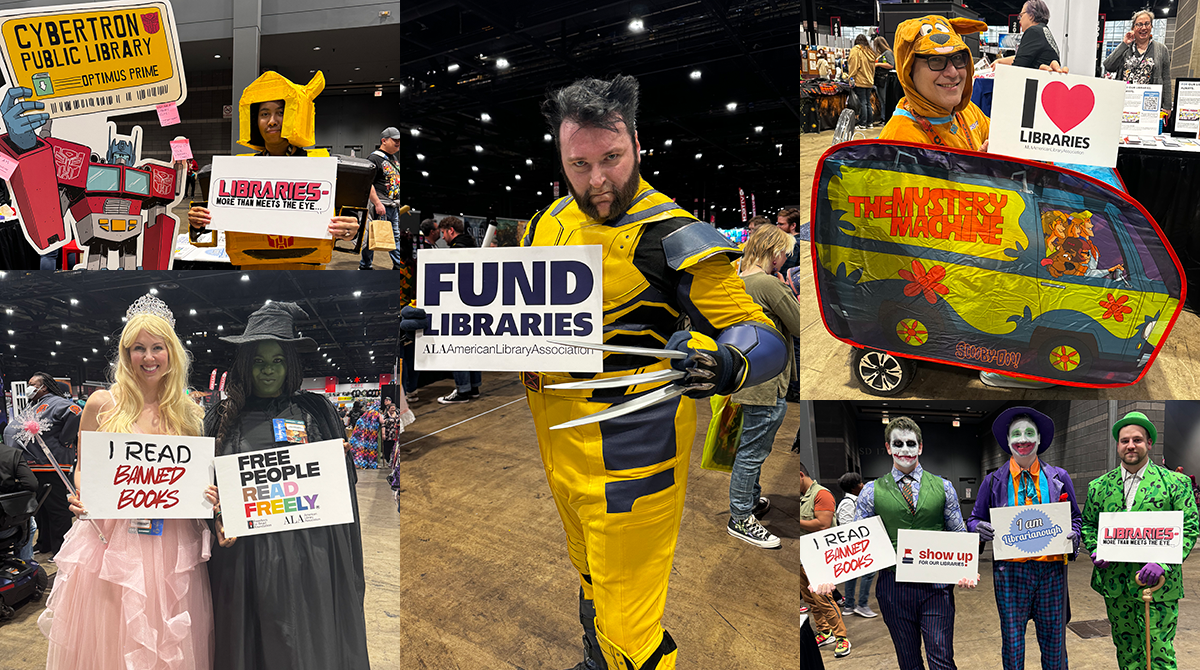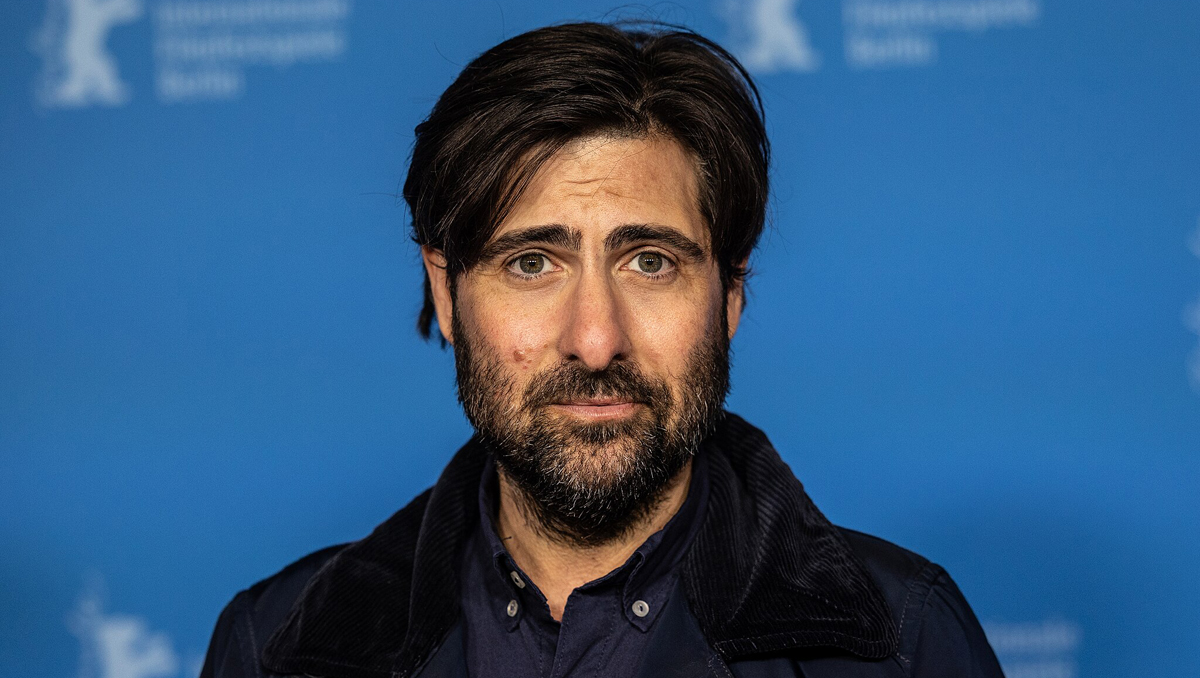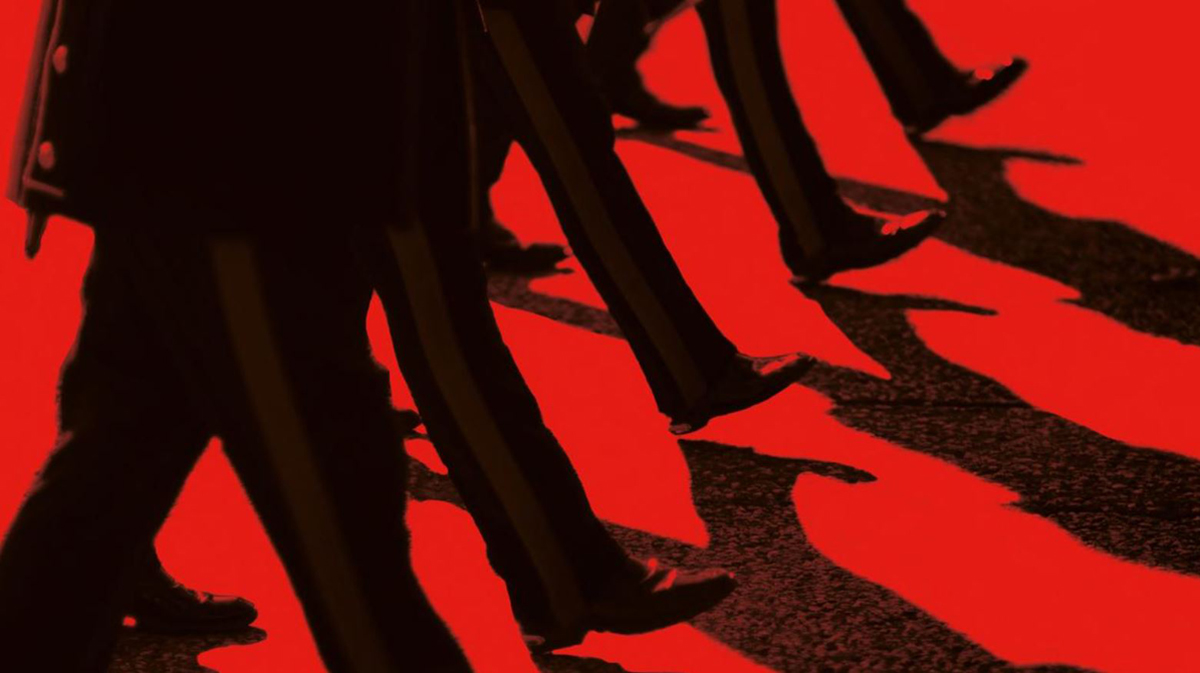The Chicago Comic and Entertainment Expo (C2E2) rolled into town April 11-13 and proved—once again—to be a haven for library lovers.
The Midwest’s largest pop-culture convention welcomed a record-breaking 100,000 people over the course of its three-day run. The attendees came to devour everything pop culture—from comics books to role-playing to video games to movies to original art from more than 500 artists and beyond. McCormick Place—the con’s host venue, located just south of Chicago’s Loop—was shoulder-to-shoulder packed with people, many of whom were dressed as their favorite pop-culture characters. It wasn’t uncommon to see Dr. Strange laughing with the Joker, the Avengers posing for photos with Mandalorians, or Batman looking at comic books next to Dr. Who.
In the middle of it all, the American Library Association (ALA) held court at a booth in the exhibit hall where visitors could learn about book bans, library funding cuts, ways to fight for their libraries, and other issues facing the library world. A large cut-out Optimus Prime from “The Transformers” comic franchise at the booth provided a popular photo opp. (Did you know that before he was the hero we know today, Optimus Prime was a librarian named Orion Pax?) Attendees were also eager to have their photos taken with signs proclaiming their love and support for libraries.
The star power on-hand at C2E2 was a definite draw this year, too. Reuniting on the C2E2 main stage were the casts of “The Lord of the Rings” films, the cult classics, “Starship Troopers” and “Robocop,” and the sci-fi comedy animated series, “Futurama.” One historic reunion, however, was near-and-dear to library fans’ hearts.
On the second day of C2E2, the cast of the 1980’s coming-of-age classic, “The Breakfast Club,” came together to celebrate the film’s 40th anniversary. It was the first time that the main cast members—Molly Ringwald, Judd Nelson, Ally Sheedy, Emilio Estevez, and Anthony Michael Hall—had been together since the film’s release. The cast discussed memories of making the film outside of Chicago, the film’s impact on their lives and careers, and its ever-growing influence.
The film, about a group of teenagers serving Saturday detention together, is famed for its deft blend of comedy and believable teenage drama backed by an unforgettable soundtrack of ‘80s hits. It’s also just as well-known for its setting—a school library. The library provides the perfect landscape for the film’s protagonists to learn about life, each other, and themselves.
“The takeaway of the film for me is the idea of commonality; that we’re more alike than different,” Hall said. “That’s really powerful …. When people watch it, it’s almost like unconscious group therapy.”
During the post-talk audience Q&A, Estevez even received praise from a librarian in attendance for his 2018 film, “The Public,” which he wrote, directed, and starred in as a librarian who faces backlash for opening-up the library to unhoused people to take shelter.
You can watch “The Breakfast Club” cast reunion in-full at Popverse.
Librarians in the spotlight
Several panel discussions at C2E2 had librarians front and center.
At the lively panel, “Ask a (Comics) Librarian,” comics librarians Mariela Martinez from Downers Grove (Ill.) North High School, Kyle Watson from Chicago Public Library’s (CPL) Sulzer Regional Library, Jason Larsen from Michigan State University, LaZerrick Kennard from CPL, and Natalie DeJonghe from Westmont (Ill.) Public Library discussed what comics librarianship looks like and how it can help bolster comics sales and growth, plus what titles comics librarians are reading and recommending.
“Comics are one of those things that are in all libraries,” DeJonghe said. “They aren’t just for kids.”
The panel detailed the changing perception of comics over the years, from youthful entertainment in the 1950s to its use as teaching tools in classrooms in the present.
“So many kids who were into comics, like me, now have their own kids,” said Larsen. “It doesn’t have the stigma that it may have had a generation ago.”
At “Teen Created Content @ Your Library,” moderator Justin Shannin, a teen services library associate at CPL, led a discussion with teens who are planning events and creating content that celebrates books, comics, manga, gaming, cosplay, and more as part of their internships at CPL. The work that these teens do to promote their passions and the library is inspiring.
From organizing gaming conventions to using CPL’s YOUMedia teen digital learning space to create videos for CPL’s Instagram accounts to compiling reader’s advisory book blogs for young readers, the panelists are using the library in new and exciting ways.
“Libraries truly can be whatever you want them to be,” Shannin said. “They can be a community space where so many things can happen, and librarians are people who really get into the profession because they love to help people and they care about equity. And remember: Teens are our future; don’t keep them out of the conversation. They’re going to be the leaders of tomorrow.”
At “Be Prepared! The Library Guide to Addressing Comic Book Bans and Challenges,” members of ALA’s Graphic Novels & Comics Round Table (GNCRT) presented ways to fight comics censorship, plus other tools and resources available around censorship issues and materials challenges. In the last few years schools and libraries have experienced some of the highest number of bans to comics since the 1950s, so this information was especially vital.
One of the main resources that the panel recommended to use in the fight against comics and books censorship are the Book Résumés created by Unite Against Book Bans, an ALA initiative that connects, equips, and mobilizes the public to advocate in their communities for the right to read and to defeat attempts at every level of government to censor reading material.
The book résumés are free resources that help teachers, librarians, parents, and community members fight book censorship. Each résumé contains a synopsis, reviews, awards, accolades, and links to resources and relevant media about a particular book. A résumé may also include information about how the book has been successfully retained in schools and public libraries where it has been challenged.
The book résumés are provided in PDF format so they can be shared with administrators, book review committees, and elected officials. They can also be passed out at board meetings and used to inform the public.
“It’s our job to defend the library,” said panelist Jack Phoenix, collection development manager at Cuyahoga Falls (Ohio) Public Library. “And arm ourselves with information.”
Become a Supporter
Subscribe to the I Love Libraries newsletter! You’ll get monthly updates on library news, advocacy updates, book interviews, book info, and more!




